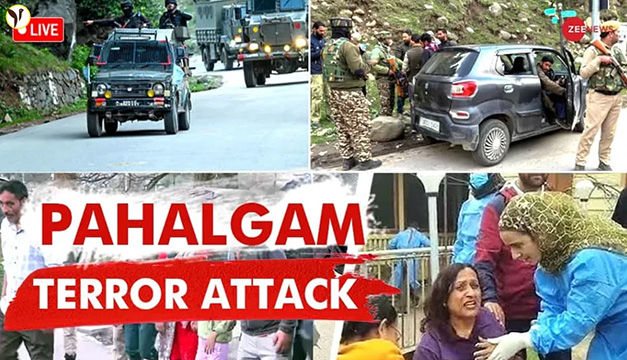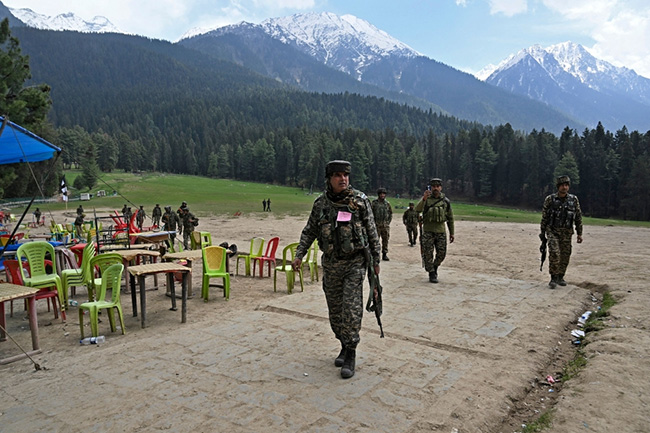
At least 28 people were killed in a brutal terrorist attack in Pahalgam, a popular tourist destination in Jammu and Kashmir, on Tuesday afternoon, reports ‘The India Times’. The attack took place in the picturesque Baisaran Valley, a serene spot known as ‘mini Switzerland’ due to its stunning views of snow-capped peaks. Tourists had gathered in the valley, enjoying pony rides, when gunmen opened fire on them at around 2:30 p.m.
Survivors of the attack reported that the terrorists, believed to be around six foreigners wearing Army fatigues, singled out their victims based on faith. They asked the victims for their names and to recite Islamic verses before opening fire at close range. The gunmen struck at approximately 1:30pm in the Baisaran meadow, located about 7km from Pahalgam, a spot accessible only by foot or horseback.
Witnesses reported that the assailants, dressed in army fatigues, emerged from the dense pine forests surrounding the meadow. They fired indiscriminately at the group of 40 tourists, causing chaos and panic among the crowd. Some survivors described how the attackers singled out victims based on their religion, forcing men to recite religious verses before shooting them. One woman survivor recounted the horror of losing her husband, stating, “My husband was shot in the head… he was shot for not being a Muslim.”
The Resistance Front (TRF), which operates as a proxy for the Pakistani terrorist group Lashkar-e-Taiba (LeT) led by Hafiz Saeed, has claimed responsibility for the horrific attack on tourists.
The TRF was banned by the government last year and has been linked to recruiting young individuals through online platforms to advance terrorist agendas, including the recruitment of militants and the smuggling of arms and drugs from Pakistan into Jammu & Kashmir, a ToI report said.
Established in 2019 as a proxy for the banned Lashkar-e-Taiba, this group has been implicated in various acts of terrorism, notably the 26/11 attacks in Mumbai. Sheikh Sajjad Gul, a commander within the TRF, has been classified as a terrorist under the Unlawful Activities (Prevention) Act of 1967.
The TRF has orchestrated numerous assaults targeting civilians, security personnel, and political figures throughout Jammu and Kashmir. It is widely believed that its operations receive backing from the Pakistani state, particularly the Inter-Services Intelligence (ISI), with the objective of perpetuating unrest in the area.
In January 2023, the Indian government officially designated the TRF as a terrorist entity under the Unlawful Activities (Prevention) Act (UAPA), and Sheikh Sajjad Gul was also designated as a terrorist.
 Pahalgam: Indian security forces in Kashmir carried out a major manhunt Wednesday, a day after gunmen opened fire on tourists.
Pahalgam: Indian security forces in Kashmir carried out a major manhunt Wednesday, a day after gunmen opened fire on tourists.
Photo: AFP
The attack has sparked widespread condemnation both in India and abroad. Prime Minister Narendra Modi, who was in Saudi Arabia at the time of the attack, cut his visit short and returned to India. He condemned the terrorists behind the attack, promising that they would be brought to justice.
“I strongly condemn the terror attack in Pahalgam, Jammu and Kashmir. Condolences to those who have lost their loved ones. I pray that the injured recover at the earliest. All possible assistance is being provided to those affected. Those behind this heinous act will be brought to justice… they will not be spared! Their evil agenda will never succeed. Our resolve to fight terrorism is unshakable and it will get even stronger,” PM Modi wrote in a post.
The attack also prompted protests in Jammu and Kashmir, with residents holding signs reading “Stop Terrorism” and demanding the resignation of Home Minister Amit Shah.
Leaders from around the world, including U.S. President Donald Trump, Russian President Vladimir Putin, and Israeli Prime Minister Benjamin Netanyahu, expressed their solidarity with India and condemned the act of terror.
Former Jammu and Kashmir Police chief Shesh Paul Vaid accused the Pakistan Army of being involved in the attack, claiming that the terrorists were members of Pakistan’s Special Services Group (SSG).
However, Pakistan has denied any involvement in the attack. In a statement, Pakistan’s Ministry of Foreign Affairs extended condolences to the victims and reiterated that it does not support terrorism.
The Pahalgam attack occurred in a region that has been a flashpoint for violence between India and Pakistan for over 70 years. Kashmir remains a disputed area, with both countries claiming it in full, and occasional skirmishes between the two nuclear-armed nations continue to destabilise the region. Domestic militant groups in Kashmir have long demanded either independence for the region or its merger with Pakistan.
The attack comes as part of a broader pattern of violence that has plagued the region in recent years. Since 2019, the Indian government has taken greater control of Jammu and Kashmir, increasing its military presence and imposing strict measures to curb militancy. Despite these efforts, attacks continue, particularly targeting civilians and tourists.
As India mourned the deaths, signs emerged of Pakistani military movement near Jammu and Kashmir, indicating growing regional tensions.
Online flight tracking data shared by defence observers showed possible deployment of Pakistani military aircraft to forward bases. Retired Naval Maritime Pilot Cdr Sandeep Dhawan wrote, “Pakistan Air Force C-130 is doing rounds of PoK. Are they preparing for our reaction? Or deploying more terrorists in the region? Both ways, things are heating up.”
Egyptian journalist Khaled Mahmoued added, “Pakistan puts Air Force on high alert amid global anticipation of Indian response to Kashmir attack. In his first official reaction, Modi vowed that the perpetrators ‘will not go unpunished’, signaling the possibility of a military or security response.”
read more in our Telegram-channel https://t.me/The_International_Affairs

 11:25 24.04.2025 •
11:25 24.04.2025 •






















